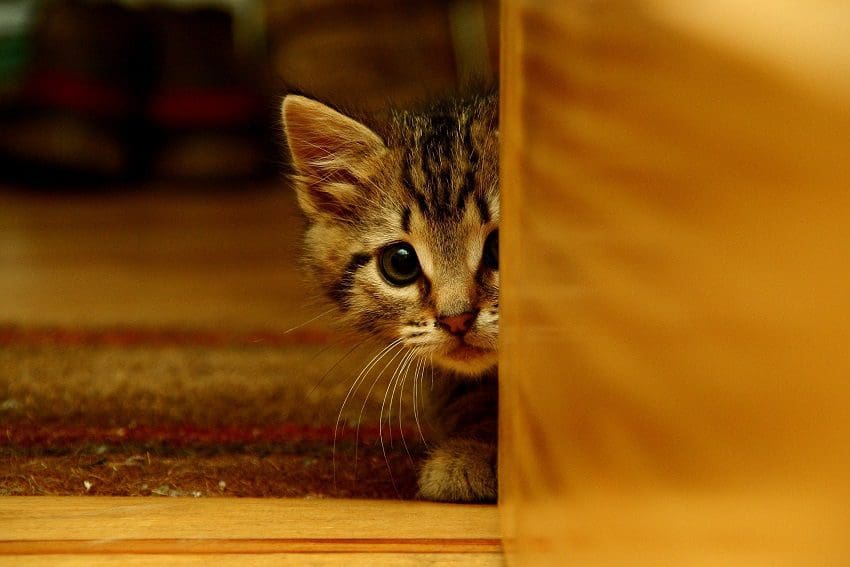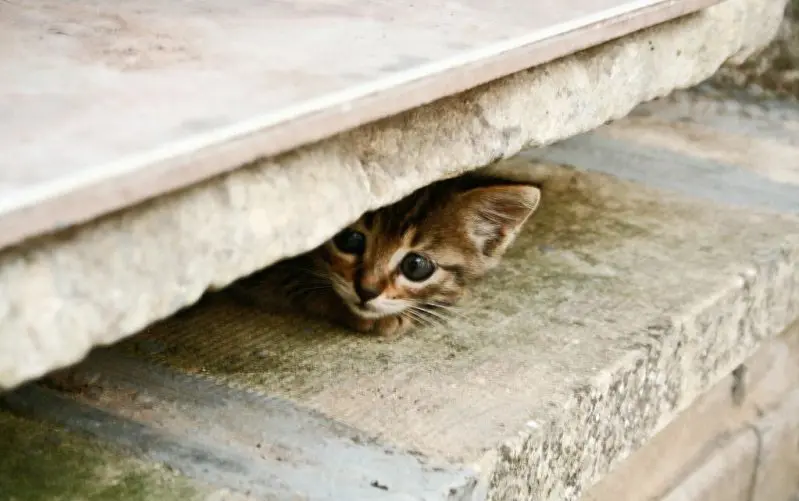Last Updated: 1 year ago
Kittens are cute, cuddly, and really good at disappearing.
New kitten owners often wonder where their kittens disappear. Despite searching, you may struggle to uncover their clever hiding spots.
While kittens are adorable, they aren’t quick to trust strangers and are very good at hiding.
Why do kittens hide, and what can you do to get them to come out? Check out our guide to find out why your new kitten is hiding.
Why Is Your New Kitten Hiding?

Like any baby, a kitten is discovering its world.
Kittens can be easily scared, and when they are transitioning to a new environment, it takes them some time to adjust.
Adult cats often prefer small, private spaces, as well, for safety and conservation of body heat.
The difference is that an adult cat’s size typically prevents them from getting into dangerously small places.
On average, cats sleep 15 hours a day. In order to rest peacefully (without fear of being hunted or disturbed), cats have an instinct to hide.
Where Your Kitten Might be Hiding

If you are on a mission to find a disappearing kitten, you’ll have to get creative.
Since they are so tiny, they are able to fit places you would never have imagined.
It’s important to check dangerous places such as inside the refrigerator (it’s possible he hopped in without you realizing it), inside the clothing dryer, washing machine, and dishwasher, behind all appliances, and near your hot water heater and furnace.
Once you’ve more or less ruled out dangerous locations, you can move on to cabinets, cupboards, drawers, closets, and behind, under, or in furniture.
You may not even realize that the batting underneath a chair, sofa, or bed has come loose, but the kitten could have discovered it and gotten up into the frame of the furniture.
Look up, too!
Kittens may leap up on top of the fridge or on a high shelf. Keep the house as quiet as possible while you search, since you don’t want to miss any tiny mews from your precocious little kitten.
What Should You Do? 5 Tips To Get Kittens Out Of Hiding
Until they grow up, kittens are vulnerable to predators, and hostile tomcats can kill them with ease.
That’s why the little ones instinctively hide in small, dark places where predators can’t reach them and wait for their mother.
When you bring your kitten home, they don’t know anything about your house or all these strange new smells. Your kitty is afraid, so hiding in a dark spot makes them less anxious about possible dangers.
The good news is that your new kitten hiding will stop as soon as they adjust to your home. But here are five tips that will help you speed things up.
1. Establish Trust

To get a kitten to stop hiding, first you should earn their trust and show that you don’t mean any harm.
Once your kitty knows that you only want to spoil them, they will quickly warm up to you and abandon their hideout.
Prepare a room for the kitten with a safe hiding place and everything else they need (water, food, and a litter box).
You don’t want your kitten to hide in dangerous locations, such as inside the washing machine or the dryer.
Then give your kitten time to calm down. Remember that it’s scary when you’re so small and away from your mother for the first time.
You might leave something with your scent in the room so that the kitten gets familiar with it.
Since you’re trying to show your kitten that nothing bad will happen to them, you should avoid grabbing the kitten, if possible.
Only resort to such measures if you think that the kitten is in danger or sick.
2. Bribe the Kitten With Food

One of the best ways to get kittens to come out of hiding is to use food. When they get hungry enough, most kittens will emerge from their spot to eat.
Choose something delicious and tempting with a strong smell, such as tuna or a piece of chicken.
Leave the food near the hiding place, retreat a few steps, and wait.
Once the kitten comes out, you might lure them near you with more food or take a few steps in their direction.
Your goal is to get your kitty used to your presence and connect it with good things, such as food.
In case you’ve lost your kitten outside, leaving cat food or their litter box outside can also tempt them to come out of hiding.
3. Offer Toys

Kittens might be wary and cautious, but they’re also playful and adventurous.
So, you might use toys to stir your kitten’s curiosity and make them want to investigate what’s going on.
Lasers, fishing rod toys, or feathers are suitable choices because anything that moves is irresistible to a kitten.
- Get a suitable toy and get close to your kitten’s hiding place.
- Move the toy around to attract your cat’s attention.
- Wait for them to emerge to paw at the toy, and reward your kitten with a treat.
Don’t give up if you don’t have much success at first. Your kitten might not come out of hiding immediately, but their curiosity will make them want to check out the toy.
You can also consider catnip toys to get your kitty to relax. However, catnip doesn’t affect kittens as much as adult cats.
I don’t recommend leaving toys lying around, especially if they have small parts or strings.
Kittens tend to eat everything they find, and swallowing a toy’s piece is dangerous.
4. Spend Time with Your Kitten

While your kitten should have some me-time to adjust to their new home, it doesn’t mean they should be alone all the time.
They will never be comfortable around you if you only come to give them food and clean the litter box.
Make sure that you spend time with the kitten every day.
You can talk to them so that they can get used to your voice or sit as close as possible when they eat.
Eventually, the kitten is going to come closer to you to check you out. Then you might attempt to pet your kitty and give them something delicious.
5. Avoid Common Mistakes

Most kittens quickly get over the initial shock of arriving in a new home and return to their playful selves in no time.
However, no one can tell you how much time your kitty will need to adjust.
Some kittens, especially those who have had a negative experience with people, might need more time than those raised in a loving environment.
You can’t rush these things, or your kitten will remain fearful and hate it when you hold them. Be patient and avoid these common mistakes:
- Don’t grab the kitten unless you absolutely have to.
- Make no sudden movements or loud noises. Move slowly and quietly.
- Don’t make eye contact.
- Let the kitten go whenever they struggle or seem uncomfortable.
- Introduce other pets slowly, and don’t leave your kitten alone with a strange cat or dog.
What About Stray Kittens
Getting a stray kitten to come out of hiding isn’t that different than dealing with a domestic one.
The main difference is that feral or stray kittens are more cautious of human contact due to lack of socialization and positive experiences. So, it takes more time.
The strategy is the same: Earn the kittens’ trust. Spend as much time as possible around the kittens, feed them, play with them from a distance, and let them make the first step.
Unfortunately, sometimes stray kittens get very sick or hide in dangerous spots. In these cases, you might have to act quickly:
- Try to grab the kitten and take them to the vet.
- Contact local rescue workers to come and help.
- Use a humane trap to catch the kittens.
Lure Kittens Out from Under a House

It’s common for mother cats to give birth under a house or a deck. It’s a secure place where most predators won’t go.
However, you might be wondering how to get the kittens out under the deck.
In general, there’s no need to attempt to remove the kittens if they are healthy, the mother is taking care of them, and they aren’t in immediate danger.
However, you might have to intervene if the kittens are constantly meowing or the mother has abandoned them.
If you’re dealing with newborns, you’ll have to get under the house or remove part of the deck. There’s no other way to get them out.
For older kittens, their mother will probably lead them outside shortly after they start walking, or you can try to attract them with food.
Then you can try to trap the kittens and their mother to find them a suitable home.
Wrap-Up
Getting a kitten to come out of hiding requires time and patience. Once the little one calms down and gets hungry enough, they will leave their hiding spot.
If you checked everywhere you could think of, sometimes just waiting is the best policy.
Open a can of wet cat food or canned tuna (that was what always worked best for us!) and set it out. The smell of something yummy may just cause your kitten to wake from his cozy slumber and reappear.
Chances are good that your kitten is not in danger in whatever spot he’s chosen to hide, and he will eventually become hungry, cold, or frightened and start to cry.
Listen for him so you can go to him when he makes his location known. At least you’ll know where he might be hiding next time it happens.
Resources:

